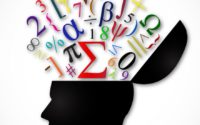Advantages of Learning with an Abacus
The Ripple Effect of Abacus Learning
Earlier only a hypothesis but now a fact, based on research data and high tech machinery, using an abacus to perform mental calculations develops the right brain.
Also, besides a dramatic improvement in the ability to calculate, both on the abacus and mentally, there is a beneficial ripple effect on other areas of learning. The first is an improvement of numerical memory, next memory in spatial arrangement and last advancement in solving general mathematical problems taught in elementary school, including the four fundamental arithmetic operations: addition, subtraction, multiplication and division and word problems.
The enhancement in the numerical memory is possible because abacus learners place numbers on the image of an abacus in their imagination as they mentally calculate with the abacus method. An assignment to remember three to nine digit numbers read aloud, memorized and orally recited would decide the extent of the numerical memory of learners. Abacus learners were found to be far superior in the accuracy of their memory and the number of digits they were able to memorize when compared to the non-abacus learners. The abacus image in their imagination also helped them recite the memorized numbers backwards. This could only happen because of the application of the procedures used in the abacus method of calculation in approaching the memory assignment.
The second beneficial ripple effect is an enhancement in the memory of spatial arrangement. In another assignment, learners were asked to memorize the position of the dots at the vertical and horizontal intersection of squares on a 3/5 grid. The learners were allowed to look at these dots for a few seconds and then they were asked to mark the dot positions on a blank 3/5 grid. Here again, the abacus learner outscored by a large margin the non-abacus learners. The abacus learners could achieve this feat as they could fix the dots on the beads of the abacus image in their imagination and duplicate the dot positions on the blank 3/5 grid.
In solving the general mathematical problems of addition and multiplication of one digit numbers, addition and subtraction of multi-digit numbers, word problems involving addition and subtraction the abacus learners outperformed the non-abacus learners in a study conducted on third grade students.
According to another study accurate and rapid calculation of was found to lead to better results in multi-digit calculation which further lead to improved results in word problems. Spending more time on actual problems then on doing simple calculations lead students with abacus learning solve them accurately.
Abacus learners were also found to be consistently good in comparing numbers, fractions and in calculation of numbers with multiple proposed answers.
So, the greatest advantage of abacus study is the learner’s ability to calculate simple problems rapidly and accurately. Besides, they also acquire the ability to calculate using an abacus image which allows for quick calculating and memorizing without the abacus.
With such strong proof to support the use of abacus, it’s very important that schools and teachers imparting education in mathematics for smaller classes use this tool optimally. Nischal Smart Learning Solutions has come with unique exercises on the abacus to make learning mathematics fun for children.







